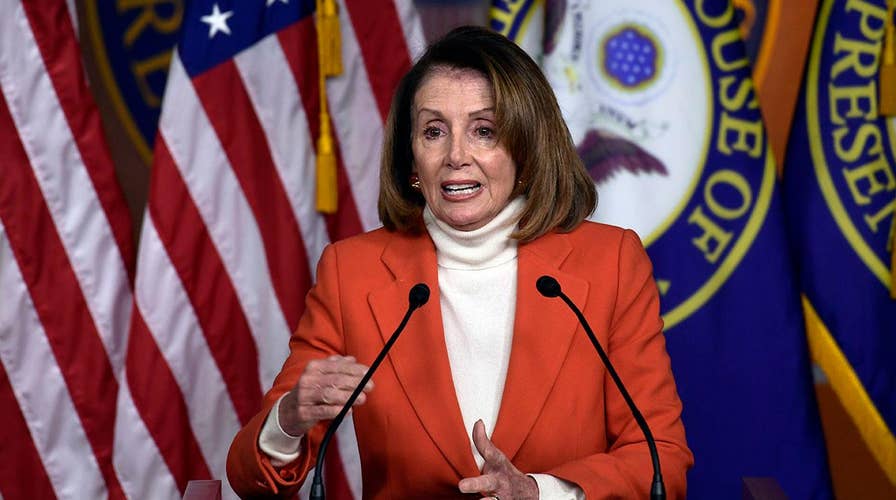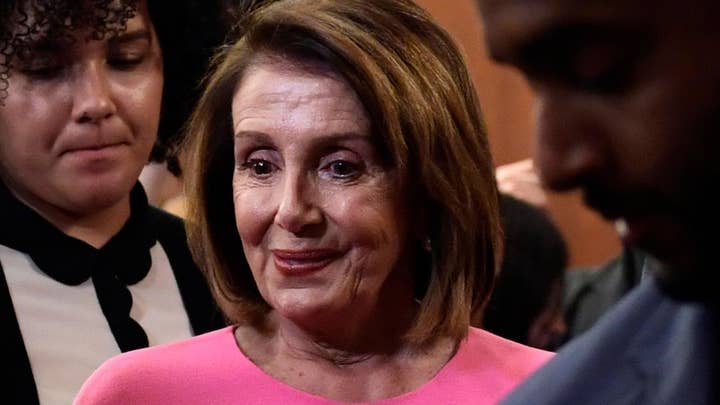Pelosi faces potential challenges for House Speaker bid
Democrats battle for future of party as some refute Nancy Pelosi. Fox News' Mike Emanuel reports from Capitol Hill.
Call it the House Democratic version of draining the swamp.
When Democrats in the House of Representatives assume the majority in January, they plan to introduce a sweeping “democracy reform” bill made up of a hodgepodge of past proposals that went nowhere under Republican control.
The package includes authorizing large-scale government-funded political campaigns, mandating automatic voter registration and altering the Constitution to scrap one of the left’s least favorite Supreme Court rulings.
“On the first day of the new Congress, Democrats will introduce a bold and sweeping democracy reform package that will end the dominance of big money in our politics, ensure that public servants behave in Washington and make it easier, not harder, to vote,” Rep. John Sarbanes, D-Md., told Fox News. “Democratic leadership is committed to advancing this reform package right out of the gate in the new Congress.”
Democrats are calling the bill H.R. 1, which means it’s the first House resolution of the new Congress.
In his statement, Sarbanes seemed to acknowledge the package is more about sending a message, as it's unlikely to become law under a Republican-controlled Senate and White House.
“Passing this reform agenda in the House will send a powerful message to the public that Democrats will lift up the voices of hardworking Americans and put them back in charge of our democracy,” Sarbanes said.
House Minority Leader Nancy Pelosi, D-Calif., has called H.R. 1 a “better deal for America’s democracy” and said it would be the first bill voted on in the new congress.
She referenced an Oct. 3 letter signed by more than 100 House Democratic candidates calling for “limiting the influence of big donors on campaigns” and “requiring genuine accountability through disclosure of all political spending and ensuring foreign money has no way of influencing our elections.”
One proposal that could be wrapped into H.R. 1 is the Disclose Act, which requires all organizations that spend money on elections to disclose their donors. House Democrats also plan to include in the bill the Automatic Voter Registration Act.
Sarbanes previously sponsored the Government by the People Act, which has 160 House Democratic co-sponsors. The bill would establish a Freedom from Influence Fund to match to provide $6 in federal money for every $1 in small donations (of no more than $150) a candidate raises. The Sarbanes proposal also would establish a $25 “My Voice Tax Credit,” allowing citizens to write off campaign donations.
Half of the newly elected House Democrats refused to accept corporate PAC money, according to End Citizens United, itself a political action committee that spent $8 million to elect Democrats to Congress, The Washington Post reported.
Even if the sweeping reforms legislation isn’t enacted in the next two years, Democrats can put this on the public agenda as a campaign issue for 2020 and potentially as a model for states to adopt, said David Keating, president Institute for Free Speech, which opposes restrictions on campaign spending.
“It’s terrible for free speech and it would be a tax subsidy for politicians,” Keating told Fox News.
There is no draft language of precisely what H.R. 1 will say, but Keating is most concerned about the specifics behind a constitutional amendment to overturn the 2010 Citizens United ruling, in which the Supreme Court ruled that corporations and unions have the First Amendment right to spend on elections.
“They are basically talking about repealing the First Amendment,” Keating said. “You can’t write a constitutional amendment just overturning a Supreme Court case. It has to have content, which would put Congress in charge of policing speech about Congress.”
Rep. Rick Nolan, D-Minn., in a constituent newsletter on Tuesday, sought to rally support for overturning the Citizens United ruling.
“Now more than ever, our nation’s future depends on overturning the U.S. Supreme Court’s Citizens United decision, so we can finally put a stop to the billions of dollars in secret, dark money corporations and special interests are permitted to spend for terrible, false, and negative TV ads,” Nolan wrote.
The proposed amendment to overturn Citizens United, “grants Congress and the states the power to implement and enforce this amendment by appropriate legislation. They are allowed to distinguish between natural persons and corporations or other artificial entities created by law, including by prohibiting such entities from spending money to influence elections.”
However, it takes a two-thirds supermajority to pass a constitutional amendment, while any other aspect the package could pass with a simple majority.
A federal matching system could also get out of hand, Keating said.
While some states have a public financing system for candidates, Keating said that only New York City has anything comparable to what Sarbanes is proposing. The fund is administered by the city’s Campaign Finance Board, which has come under scrutiny for allegedly becoming politicized.
“When you think of good government, you don’t exactly look to New York City,” Keating said.















































